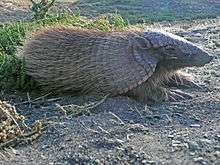Euphractinae
| Euphractinae Temporal range: Middle Eocene to present | |
|---|---|
 | |
| Chaetophractus vellerosus | |
| Scientific classification | |
| Kingdom: | Animalia |
| Phylum: | Chordata |
| Class: | Mammalia |
| Order: | Cingulata |
| Family: | Chlamyphoridae |
| Subfamily: | Euphractinae Winge, 1923 |
| Genera | |
| |
Euphractinae is a subfamily of armadillo in the family Chlamyphoridae. It contains the following genera:[1]
- Chaetophractus, hairy armadillos
- Euphractus, six-banded armadillos
- Zaedyus, pichis
Extinct genera include Paleuphractus, Doellotatus, Proeuphractus and Macroeuphractus.[2]
A mitochondrial DNA investigation has concluded that Euphractinae is the sister group of a clade consisting of Chlamyphorinae (fairy armadillos) and Tolypeutinae (giant, three-banded and naked-tailed armadillos)[3] along with extinct glyptodonts.[4]
References
- ↑ "Euphractinae". Integrated Taxonomic Information System. Retrieved 22 March 2011.
- ↑ Mitchell, Kieren J.; Scanferla, Agustin; Soibelzon, Esteban; Bonini, Ricardo; Ochoa, Javier; Cooper, Alan (2016). "Ancient DNA from the extinct South American giant glyptodont Doedicurus sp. (Xenarthra: Glyptodontidae) reveals that glyptodonts evolved from Eocene armadillos". Molecular Ecology. 25 (14): 3499–3508. PMID 27158910. doi:10.1111/mec.13695.
- ↑ Gibb, G. C.; Condamine, F. L.; Kuch, M.; Enk, J.; Moraes-Barros, N.; Superina, M.; Poinar, H. N.; Delsuc, F. (2015-11-09). "Shotgun Mitogenomics Provides a Reference Phylogenetic Framework and Timescale for Living Xenarthrans". Molecular Biology and Evolution. 33 (3): 621–642. PMC 4760074
 . PMID 26556496. doi:10.1093/molbev/msv250.
. PMID 26556496. doi:10.1093/molbev/msv250. - ↑ Delsuc, F.; Gibb, G. C.; Kuch, M.; Billet, G.; Hautier, L.; Southon, J.; Rouillard, J.-M.; Fernicola, J. C.; Vizcaíno, S. F.; MacPhee, R. D. E.; Poinar, H. N. (2016-02-22). "The phylogenetic affinities of the extinct glyptodonts". Current Biology. 26 (4): R155–R156. doi:10.1016/j.cub.2016.01.039.
This article is issued from
Wikipedia.
The text is licensed under Creative Commons - Attribution - Sharealike.
Additional terms may apply for the media files.